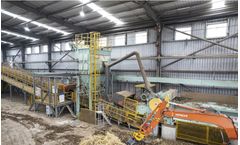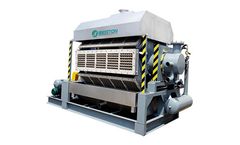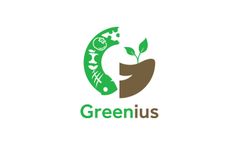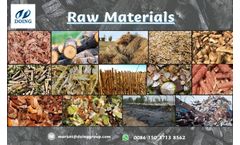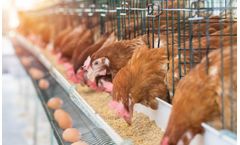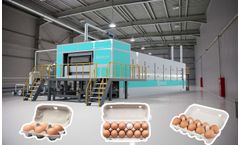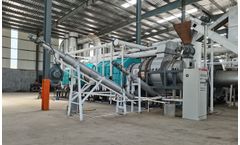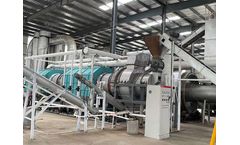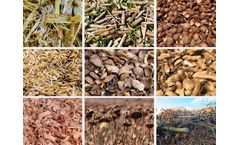Agriculture Waste Articles & Analysis
94 articles found
With charges introduced for waste exemptions, it’s important to minimise waste to reduce the cost of compliant disposal, says ADAS Agricultural Consultant Cheryl Williams. ...
The palm oil industry is a cornerstone of agricultural economies in many tropical regions, especially in Southeast Asia and Africa. As the demand for palm oil grows globally, so does the volume of agricultural waste produced—particularly palm kernel shells (PKS). Once considered a low-value byproduct, these shells are now gaining attention for ...
Additionally, the machines can be adjusted to handle various raw materials, such as recycled paper or agricultural waste, providing flexibility in sourcing materials for production. 4. ...
The "Five Utilization” of Agricultural and Forestry Wastes The "five" utilization of agricultural and forestry wastes is fertilizer, feed, fuel/energy, base material, and raw material. ...
Additionally, egg tray machine suppliers will focus on designing machines that can efficiently process a wider range of recyclable materials, including agricultural waste and post-consumer paper. This will contribute to a circular economy by reducing waste and providing manufacturers with a more sustainable raw material source. ...
In today’s rapidly urbanizing world, sustainable living practices have become more important than ever. As cities expand, so does the need for smarter waste management solutions. One such innovative solution is the use of waste to compost machine—machines that turn everyday organic waste into nutrient-rich compost for urban farming. Greenius, a leader in eco-friendly technology, is ...
Agricultural waste, which includes materials such as crop residues, wood chips, and nutshells, can be a valuable resource when converted into high-quality charcoal. ...
Biochar is a carbon-rich material produced through the pyrolysis of organic biomass under low oxygen conditions. Common feedstocks include agricultural waste, forestry residues, and even municipal organic waste. ...
Waste Management and Circular Economy Using agricultural waste to make biochar presents a sustainable solution to managing biomass waste, transforming it into a valuable product rather than allowing it to accumulate or decay. ...
Developing a Cost-Efficient Strategy for Continuous Quality Monitoring of Feed Ingredients Rich-protein grain, cereals, oilseeds and various by-products are the common feed ingredients for poultry and swine. In recent years, farmers worldwide are struggling with the increasing prices of raw materials which resulted in the need to maintain optimal livestock performance in a cost-effective manner. ...
Here's a breakdown of the benefits that make sustainable paper egg cartons the clear winner: Championing Renewability: Paper egg cartons are typically crafted from recycled paper pulp or agricultural waste like wheat straw. This reduces reliance on virgin wood pulp, promoting sustainable forest management. ...
Let's delve into the myriad benefits of producing charcoal from agricultural waste biomass. 1. Waste Valorization Agricultural waste biomass, such as crop residues, straw, husks, and stalks, is abundantly available in agricultural regions worldwide. ...
Heritage Farms, led by manager Allan Smirl for over a decade, has continuously sought innovative ways to improve their operations. In 2014, the farm began a partnership with Decisive Farming to enhance decision-making processes impacting the farm’s ...
The cost of upgrading farms using modern technology can be significant. Fortunately, there are a number of Canadian government grants for farmers, ranchers, and producers to alleviate these financial burdens. Technology plays a major role today in enhancing a farm’s production efficiency, yields and profits over the ...
Introduction Evolution of Agricultural Waste Management The landscape of agricultural waste management has undergone a paradigm shift, driven by the need for sustainable practices. ...
Environmental Benefits and Economic Viability Carbon Sequestration and Sustainable Agriculture Charcoal production from agricultural residues is not merely an energy solution; it's an environmental boon. This section explores how the process contributes to carbon sequestration, mitigating the carbon footprint while fostering sustainable ...
This age-old practice, while meeting energy demands, has led to detrimental consequences such as soil erosion, loss of biodiversity, and increased carbon emissions.Agricultural Waste as a Sustainable AlternativeThe dawn of a more sustainable era introduces the concept of utilizing agricultural waste for charcoal production. ...
The stable and controlled heat output of charcoal enables precise temperature management, critical for the success of greenhouse agriculture. Waste Utilization and Environmental Impact Conversion of Agricultural Residues Wood charcoal making machines contribute to efficient waste utilization in agriculture. ...
Introduction Agricultural waste poses a significant challenge for farmers and the environment. ...
Biochar Production: A Transformational Process Definition and Principles of Biochar Production Biochar production involves the thermal decomposition of biomass, such as agricultural waste, in a low-oxygen environment. This process, known as pyrolysis, transforms the biomass into a stable carbon-rich material called biochar. ...



